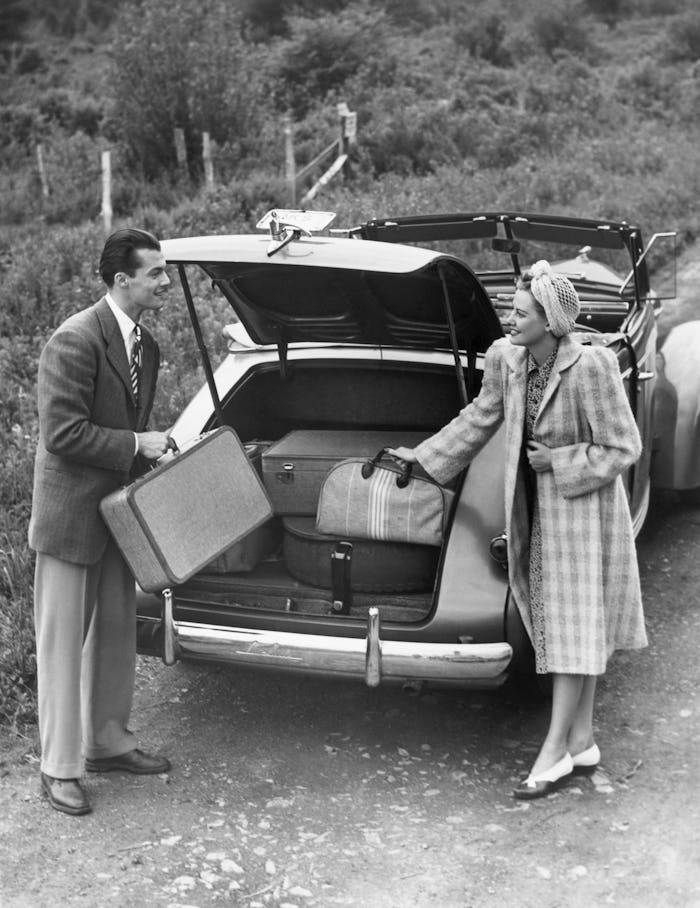
Old-Fashioned Etiquette Tips That’ll Make You Seem Classier
Some things should (and will) never go out of style.
What's considered to be good manners — as well as what's considered rude or in poor taste — can change over time, as societal views, life experiences, and technology all change themselves. Being well-mannered is just as important as being smart, creative, stylish, or anything else. It can make or break other people's opinions of you and how successful you're able to be, whether you like it or not. While modern technology requires its own set of rules, there are also plenty of old-fashioned etiquette tips that'll make you seem classier — tips that your parents and grandparents may have learned, and that still hold true today.
First impressions are important, but you shouldn't just practice your best manners only when meeting people for the first time. Plenty of etiquette best practices are things that you should be doing all the time or, at least, regularly. From comfortably navigating a meal, to corresponding with others with ease, there are many tried-and-trues that work just as effectively today as they did many years ago. Just because the times have changed doesn't mean that everything you thought you knew about etiquette has. Being kind, polite, and well-mannered will never go out of style.
1Keep Your Plate So Your Companions Won't Feel Rushed
When you're out to eat with friends, family, colleagues, clients, or a partner, if you finish your meal first, it's polite to tell the waiter trying to clear it that you'd like to keep it so that the person with whom you're dining won't feel rushed.
2Chew With Your Mouth Closed
Chewing with your mouth closed is an essential skill. No one wants to see or hear what's going on in your mouth while you're eating a meal. Keeping your mouth shut while you're eating is good manners. Yes, it's something that kids need to learn, but it's something that adults should keep in mind, too.
3A Standard Tip Is 20 Percent
Tipping can be a contentious topic, but, if you're somewhere that practices tipping, you need to know how to do it correctly. The standard number for tipping is 20% for a full-service restaurant. It might seem high to some, but if you've ever worked in the service industry and had to live off of tips, you likely understand that leaving a respectful tip is important and know that all those tips also might get shared. And it tells your dining companions that you're not a cheapskate.
4Don't Insist On Dinner Plans At A Restaurant Friends Can't Afford
If you're in charge of dinner plans, make sure you take everyone's finances into account. Insisting on a celebratory dinner at a restaurant that most of your friends can't afford, for instance, really isn't very polite. Consider your friends' financial statuses when choosing a restaurant. Your friends will appreciate your thoughtfulness when their credit card comes and they don't have to fret over a giant bill they can't pay.
5If Someone Gives You Their Full Attention, Give Them Yours
It's safe to judge how much attention you should be paying off of how much everyone else is paying you, as Refinery29 noted in the previously mentioned article. If you're at the park, for instance, and both you and your friend are watching your kids while also having a conversation, it's understandable and not rude to keep glancing over at the swing set. If you're out to coffee with a co-worker, however, to work on a presentation and they're focused on you when you're talking, you should give them that same consideration. If it’s going to be your treat, let your friends know to you want to take them out and to meet you at a certain place and time.
6Introduce Yourself With First And Last Names
It's polite to introduce yourself to someone new with both your first and last names if you're in a professional setting. It's more memorable than a single name, especially if your name is common, and makes it easier for them to track you down should they need to.
7Graciously Accept Kind Gestures
Should a man always open a door for a woman? That's really not necessary anymore, but if the man walking in front of you does hold the door (or pulls out your chair at dinner), accept the gesture graciously and simply say “thank you.”
8Dress For The Occasion
Dressing appropriately for the occasion is, in fact, polite. Make sure you know how to decipher what's appropriate for a given situation and what isn't. You'll usually feel more embarrassed if you're under-dressed than if you're over-dressed, though.
9Follow The Directions On The Invitation
While it might not seem like a big deal to you if you bring a gift if the invite says not to, for instance, proper etiquette says that you should follow the directions that the host wrote on the invitation (that goes for RSVPing by a certain date as well). If the invitation came with a reply card, always send back the reply card, no matter what your response it. Don't just give the host a verbal reply.
10Say "Please" And "Thank You"
It might sound like a no-brainer, but you'd be shocked by how many people seem to think that "please" and "thank you" are unnecessary, optional words and phrases. They're not. Using these phrases when conversing with others and appropriate is still the polite and respectful thing to do.
11Show Your Appreciation
Follow up events, meetings, and more with a thank you note. In this day and age, usually a verbal or digital thanks via text or email will usually suffice, but a handwritten note, especially when dealing with someone you are trying to make a good impression on, helps build or strengthen a relationship between the two of you.